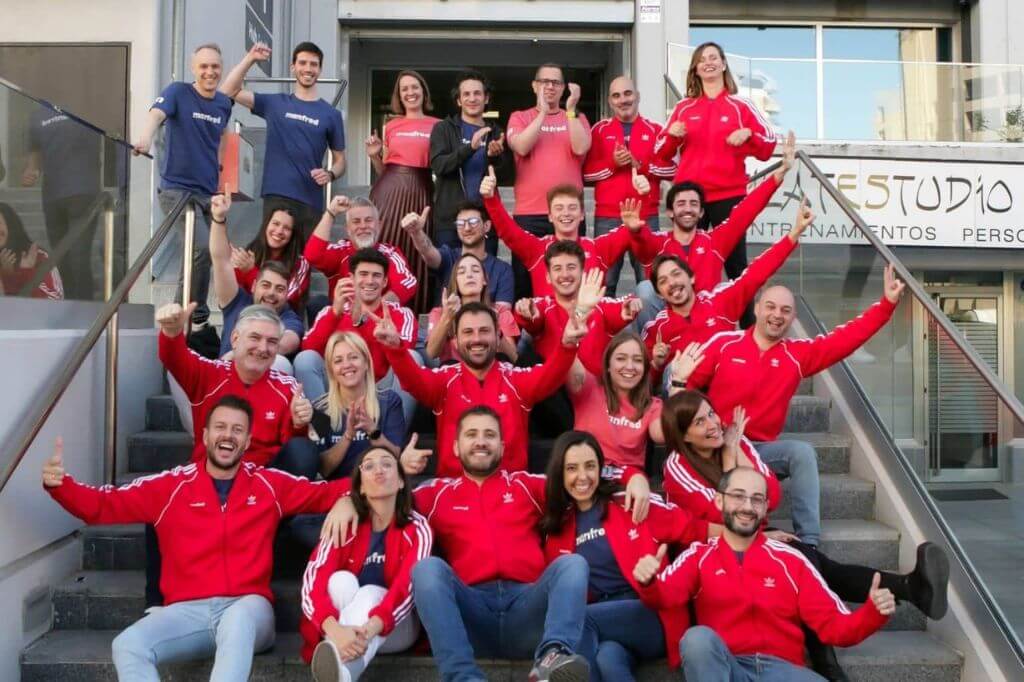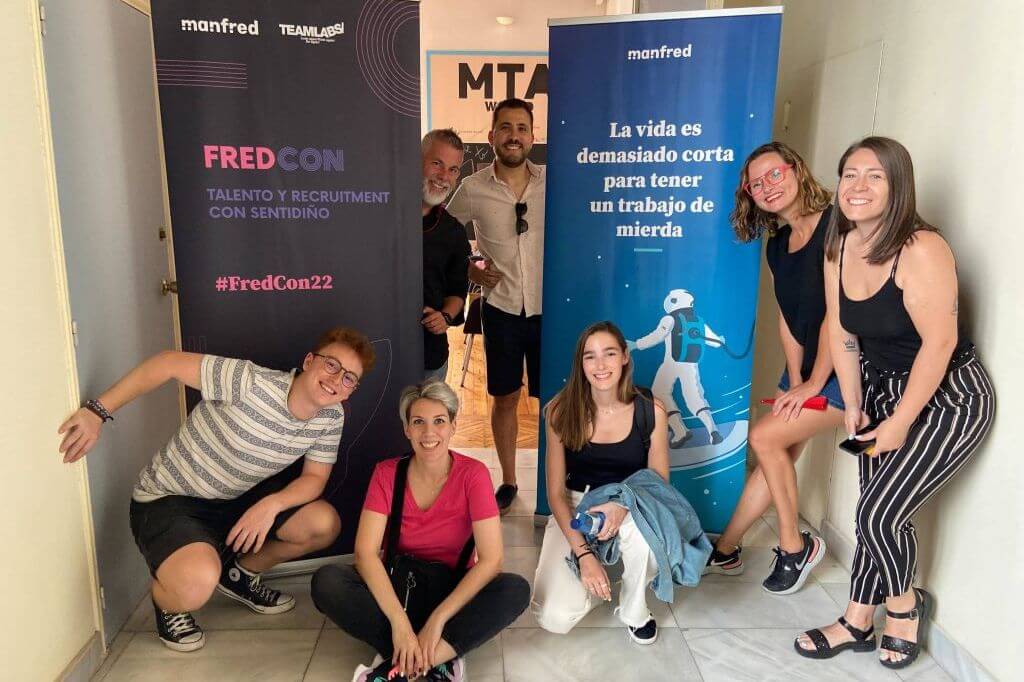Talent is our greatest resource. Employees make the difference in driving the company’s growth. But also to build and reinforce their company culture, thus improving the work environment in which they develop their professional careers. That is why, for David, “when we work in human resources, it is to work less focused on resources and more thinking about humans”.
David Bonilla, CEO and Founder of Manfred, a talent agency created by developers for developers, does not come from the world of Human Resources, “I am a computer engineer, I don’t know if I am from Galicia, if I am from Madrid, but I do know that I am a computer engineer“. He did not like what he saw in other Recruiting agencies, “so I set up the recruiting service, which I would have always liked to enjoy, both from the candidate’s point of view and that of the company, nothing else“.
David works for the people who make up Manfred, the Fedders, with the goal of creating a company culture that makes people satisfied. A company culture that fosters an enviable work environment. “What we are most proud of is that we’ve created a company we love to work for. That’s our greatest achievement”.
First, the cultural fit
When it comes to conducting their own internal recruitment processes, David has a clear idea of where Manfred’s priorities lie, in cultural fit, in being loyal to their company culture. “First of all, we have a very important cultural filter, we need people to fit with us. We don’t care whether or not they have all the skills we ask for or all the experience we need, but we need them to fit in terms of company values”.
Seeking a good fit in a people-first company culture fosters a sense of belonging, of community. That’s why Manfred looks for a talent that “understands that people always come first, that our reputation is the most important thing. That the only way we can do marketing is by doing things right”.
Looking for an improvement in company culture and work environment putting the focus on people leads to engaged employees who work with enthusiasm to ensure that the company fulfills the mission for which it was created. “Everything has a business goal, but basically the idea on which everything pivots is, call me crazy, but if I provide value, if I’m good, then potentially tomorrow you’ll be back“.

A company culture that fosters teamwork
As we previously said Manfred puts people first. That’s why, even before their talent starts working, they start preparing everything to welcome the new Fredder to the team. They define it as a pre-onboarding process, “where we try to solve all those logistic matters prior to the incorporation. Where do I have to send you the laptop, because we work fully remote, the phone, etc. And give you basic indications of what you’ll find”.
But, of course, the process for Manfred doesn’t end there, “We have an onboarding process where we have a person who is with you all day long. And where we believe that the best way to learn is to do”.
The accompaniment of people and teams is key to improve work performance, to enhance the development of employees and seek their productivity to grow rapidly, “this implies that we have to have a very measured onboarding process, and ask questions step by step. To know if you are getting to know everything, if you are well, if you are comfortable with your colleagues“. Teamwork is key to Manfred’s company culture.

It’s vitally important to work hand in hand with new hires to guide them through their learning curve and Manfred has learned this well. His new Fredders are accompanied in the adaptation phase, but also once they are ready to start out on their own,“you have a lot of colleagues you can always ask questions to. You have daily meetings, not to report what you’ve done, that’s nobody’s business. But potential problems you have. And you can ask for help to solve them”.
Manfred has an onboarding process where teamwork is reinforced, it’s part of who they are. To grow, all employees must collaborate and row in the same direction; “in Manfred all the objectives, all the bonus is teamwork. So there is no competition, there is collaboration“.
Continuous feedback as a lever for continuous improvement
A company culture based on feedback is not achieved overnight. It requires establishing the habit among employees so that feedback naturally becomes part of the DNA of the culture itself. It is essential to pursue it to ensure that we are building our company culture based on the wishes of its pillars, the employees.
Feedback helps us to know where we need to work to build that company culture and create a better employee experience. In this way we will be true to what David said a few lines above, “people always come first”.
A company culture focused on feedback allows us to obtain information about what concerns our people. What they think we should improve on or, conversely, what they love and what we should continue to do. It’s a wonderful resource for any company that, like Manfred, puts its people first. If you don’t ask, you don’t know and David is clear about that, “we have Nailted as a great feedback tool. Not just to ask them to tell us things, but even to ask them”.
The good thing about asking and receiving anonymous feedback is that it allows you to detect problems that you don’t see with the naked eye. How else would you know how your employees are really doing? “Nailted is important to get a pulse on how the team is doing and identify a problem before it really becomes serious, and resolve it. We have 1:1 managed with Nailted, to follow up with people and give us feedback. That’s what we do to try to keep people happy”.
At Manfred they work on internal feedback on an ongoing basis in order to reinforce their company culture. Asking for feedback is a responsibility. It is a commitment that there is an interest in improvement. In David’s own words, “it really means realizing whether you are committed to trying to solve the team’s problems”. That’s why feedback should not just be about asking questions and collecting answers, but about taking action. If you ask for feedback but don’t do anything, credibility goes down and employees’ interest in getting involved in the company’s affairs is lost, “that’s when people switch off and say well, if it’s not worth anything, what am I going to give it for? You have to take it seriously”.

Feedback as a guide for working on the employee experience
Feedback should not remain mere words. David often comments with Marta, who is the colleague in charge of Happiness; “I think it’s a good idea that the feedback should not be evaluated by just one person, especially if it is feedback that affects you directly. You need someone to modulate you for better and for worse”.
When we work with feedback, we must demonstrate that it has great value and that this feedback will be the lever that managers and leaders in people management need to improve the employee experience, always in line with the company culture. “From there we have to make decisions, what to do. I think one of the things we have to improve a lot is this ability to execute based on feedback. Many times I received it and I didn’t have time to do anything. So we have a person who is very much on top of ‘hey remember the team has passed this on'”.
In this way, by turning feedback messages into actions that have a positive impact on our people, we can show the value they have. At the same time that we improve the employee’s experience, “it can be transformed into an action, into empowering someone, and it can become a talking point. A lot of times they’re not right. So why did they tell me this? We have to find out what’s there, and from there take action. And then we follow up”.
Giving feedback the importance it deserves is the way we will be able to establish it as a habit and transform our company culture into a true feedback culture. David is clear about the importance of feedback in all its aspects, “not just to our employees, which is, of course, easy to do with Nailted. But with any stakeholder involved in the company. We ask everyone if we are doing well. It’s critical”.
However, “collecting feedback doesn’t mean that the feedback is always positive or that it’s appropriate”. We may be in for more than one surprise. But the good thing about feedback is that, even if we don’t agree with the messages we receive, we can get much more value out of them than we think, “it’s a guide to know what you have to convey. If someone gives you feedback that doesn’t make any sense, it’s probably because they lack information, because they lack context”.
You may have heard us say it on other occasions, but feedback, in order to be accurate and sincere and help us to reinforce our company culture, must be anonymous, so how are we going to be able to take action then? At Manfred they are clear, “you don’t know who it is, but you already have a fantastic item to explain in a retro or to create an internal chat and explain to the team what is happening so that it doesn’t happen again. And we use that quite a lot, actually”.

Company values: Transparency first and foremost
Transparency is the basis of any relationship of trust. It could not be less so between a company and its employees. Manfred has established it as one of its main company values within its company culture, “a lot of transparency. Many things can happen at Manfred, but it is difficult for someone to be surprised by something”.
Working with transparency has many more benefits than we think. When a company is transparent, employees work happily and calmly knowing that they have full knowledge of everything that is going on around them. And that only improves employee engagement, company culture and the work environment; “We try to create an environment where people learn, evolve and become better professionals and where people want to be. So the best thing we can do is to be totally transparent, to tell what we do”.
Improving the work environment positively impacts company culture and employee satisfaction, “I’m sure almost anyone working at Manfred right now could get paid a lot more somewhere else, but I think people like it. When Friday comes and you go away for the weekend you get that feeling that you’re in a place that’s okay, what I’m doing is okay. It has a good effect and that’s kind of what we try to do, explain how proud we are of what we do”.
By fostering that transparency what you will achieve is “that no one leaves. Or at least that they don’t leave because they are unhappy, but because something better has come along. If they find an opportunity, they should not leave because they are unhappy”.

A culture of values and opportunities
Attracting talent is not easy. And even more so when “we start from the premise that in the current context we will never be competitive in terms of salary, there will always be someone who will pay more. So we don’t try to compete at all”.
Company culture and company values play a key role here. How do they attract talent to Manfred? David was blunt, “people are going to think it’s a very silly or very innocent thing to do, but that you really aim to try to change things and help people evolve their careers”.
Manfred believes in people and in giving opportunities as a differential value of its company culture, “almost everyone at Manfred does something that goes beyond what they were hired for. It is very complicated to have an initiative to do something and be told ‘no’, that is very, very, very, very, very, very, very, very, very, very complicated”.
The basis of it all? Freedom, trust and autonomy, “I trust you, do what you have to do, it is clear that you are going to try to do your best”.
In many cases, the reason behind employee retention and satisfaction lies in their well-being. And to a large extent that means building a positive company culture and ensuring that they develop their potential to the fullest; “the company has to give them those challenges or incentives so that they want to be there. What we have to make sure is that every year they evolve, that they become better and better professionals, that is, that they can opt for more and better jobs and still want to stay”.
Manfred is what he is because of the way they live their corporate values and build their company culture; “if I tell you that I want to change people’s lives and you realize that day after day we are consistent with those values, then if you agree you probably like being in a company like that”.









